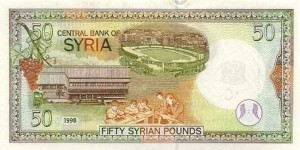
Money has been streaming out of Syria as fears for the unstable economy lead Syrians to seek a safer place for their assets, according to members of the country’s business community.
Cash is being smuggled over the border to Lebanon “every day, every hour,” said one Syrian businessman, while another claimed Syrian money is being stashed in the grey economy that has long existed between the two countries.
In what many see as an example of the cross-border transfer, Syrian state news reported last month that officials had intercepted over $100,000 worth of Syrian pounds being smuggled across the Lebanese border under the seat of a car.
Samir Seifan, a Dubai-based Syrian economist, estimated Syria’s middle and upper classes had moved between three and five billion dollars out of the country since unrest broke out in March, alarmed by pressures on the currency and the dearth of investment opportunities.
“The easiest way to smuggle money out of Syria is into Lebanon,” said Mr Seifan. “There are established channels.”
Reports of the cash exodus highlight the growing financial pressure on President Bashar al-Assad’s Damascus regime, after nearly eight months of bloody confrontations between anti-government protesters and the regime’s brutal security forces.
The loss of foreign currency earnings from the decimation of the tourism industry and an EU embargo on Syrian oil exports have put pressure on the Syrian pound, which has lost 10 per cent of its value against the dollar on the black market since the start of the unrest.
Capital controls introduced by Damascus in August prevent people from buying more than $2,000 a year in Syria without justification. Though locals say dollars can still be bought, with increasing difficulty and risk on the black market, many people are said to be seeking ways around restrictions on transferring money out of the country.
According to one of the Syrian businessman interviewed by the Financial Times, some people exchange Syrian money brought into Lebanon ‘under the table’. “We’re not Europe,” he said wryly.
As quantities appear to be either small or bypassing formal channels, the money does not show up in financial institutions in Lebanon, Syria’s neighbour, which is a crucial link to the wider world. The banking sector, under the watchful eye of the US Treasury, which this year placed sanctions on a Lebanese bank it alleged was laundering drugs money, has increased its customer accountability requirements, and overall deposits of local currency and dollars have gone up by less than they did over the same time period last year.
Lebanon’s usually freewheeling money changers are reluctant to talk about Syrian money, although the owner of one exchange bureau in Beirut said he was currently processing 400-500,000 Syrian pounds a day (roughly $8-10,000), compared with 100-200,000 ($2-4,000) a week before the crisis.
Another man in the bureau warned: “Its more dangerous to talk about this than politics,” an oblique reference to the Syrian security services’ tentacular reach into Lebanon.
Jihad Yazigi, an economic analyst and editor of the newsletter ‘The Syria Report’, said Syrians had “got used to finding ways to get money out of the country,” after years of tough restrictions on capital movement before limited economic reforms began in 2005. He said one trick was to pay someone inside Syria in Syrian pounds, in exchange for a return payment in a foreign currency in a bank overseas.
Observers of the capital flight say it is a steady flow rather than a panicked rush that could bring the Assad regime down in the short term. The Syrian Central Bank governor recently claimed Damascus had $18bn worth of foreign reserves – about 30 per cent of GDP – to keep the pound stable.
But analysts say the real amount of resources with which Mr Assad’s government has to defend the pound – and keep itself alive economically – is unknown because of a lack of transparent accounting. “The truth is that probably no one knows – not even the regime,” said one diplomat in Damascus.

Leave a Reply
You must be logged in to post a comment.